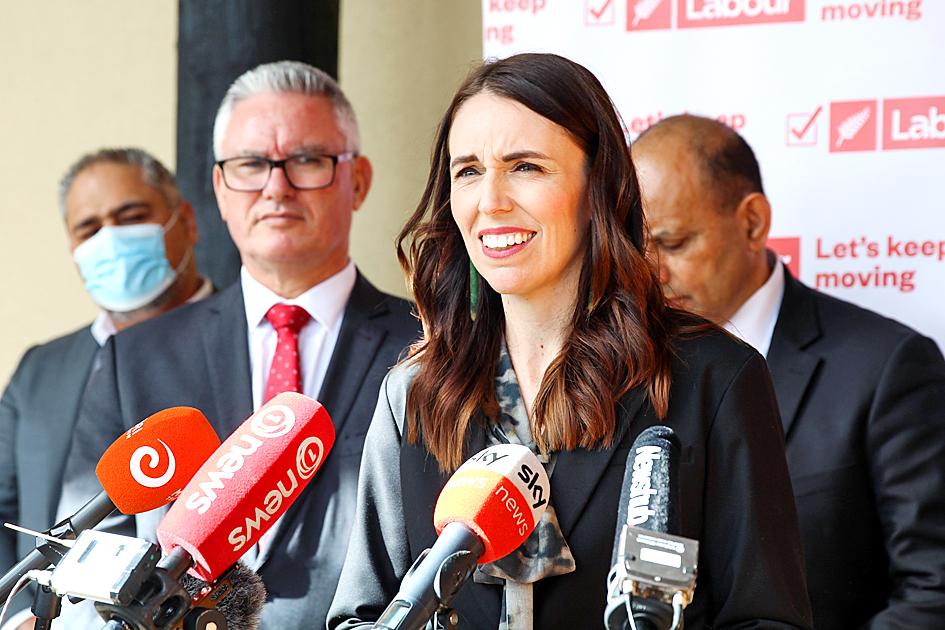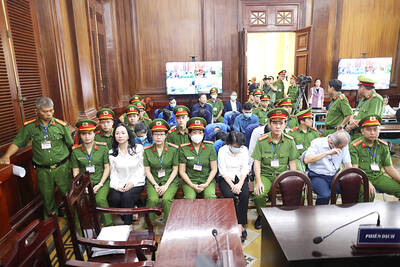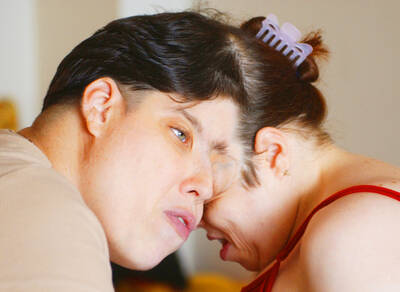New Zealand on Monday next week is to lift COVID-19 restrictions across the country, except in its biggest city, Auckland, which is the epicenter of a second wave of infections, New Zealand Prime Minister Jacinda Ardern said yesterday.
Auckland’s restrictions would be reviewed on Monday next week, Ardern said.
The government is also to immediately ease all physical distancing requirements on planes, a boost for Air New Zealand, which has for months had to limit passengers on its aircraft, she said.

Photo: EPA-EFE
“I know this change will make a real difference to Air New Zealand and those parts of the country seeking increased numbers of visitors,” Ardern told a news conference in the South Island city of Dunedin, where she is on an election campaign trip.
Masks would still be mandatory on all public transportation, she said.
New Zealand, a nation of 5 million, had appeared to have succeeded in halting community transmission of COVID-19, but a fresh outbreak in Auckland in August prompted the government to place the city back in lockdown.
Ardern, who is facing a general election on Oct. 17, scaled back the restrictions this month, but the city is still under alert level 2.5, meaning social gatherings of more than 10 people are not allowed.
Ardern’s Cabinet is to review the rules for Auckland at its meeting on Monday next week, with a view to increase gathering limits if the situation stays stable.
That change, if it comes, would take effect on Wednesday next week, she said.
New Zealand reported one new case of COVID-19 in the community, taking the total number of cases to 1,447 and 24 deaths.

Republican US lawmakers on Friday criticized US President Joe Biden’s administration after sanctioned Chinese telecoms equipment giant Huawei unveiled a laptop this week powered by an Intel artificial intelligence (AI) chip. The US placed Huawei on a trade restriction list in 2019 for contravening Iran sanctions, part of a broader effort to hobble Beijing’s technological advances. Placement on the list means the company’s suppliers have to seek a special, difficult-to-obtain license before shipping to it. One such license, issued by then-US president Donald Trump’s administration, has allowed Intel to ship central processors to Huawei for use in laptops since 2020. China hardliners

A top Vietnamese property tycoon was on Thursday sentenced to death in one of the biggest corruption cases in history, with an estimated US$27 billion in damages. A panel of three hand-picked jurors and two judges rejected all defense arguments by Truong My Lan, chair of major developer Van Thinh Phat, who was found guilty of swindling cash from Saigon Commercial Bank (SCB) over a decade. “The defendant’s actions ... eroded people’s trust in the leadership of the [Communist] Party and state,” read the verdict at the trial in Ho Chi Minh City. After the five-week trial, 85 others were also sentenced on

Conjoined twins Lori and George Schappell, who pursued separate careers, interests and relationships during lives that defied medical expectations, died this month in Pennsylvania, funeral home officials said. They were 62. The twins, listed by Guinness World Records as the oldest living conjoined twins, died on April 7 at the Hospital of the University of Pennsylvania, obituaries posted by Leibensperger Funeral Homes of Hamburg said. The cause of death was not detailed. “When we were born, the doctors didn’t think we’d make 30, but we proved them wrong,” Lori said in an interview when they turned 50, the Philadelphia Inquirer reported. The

RAMPAGE: A Palestinian man was left dead after dozens of Israeli settlers searching for a missing 14-year-old boy stormed a village in the Israeli-occupied West Bank US President Joe Biden on Friday said he expected Iran to attack Israel “sooner, rather than later” and warned Tehran not to proceed. Asked by reporters about his message to Iran, Biden simply said: “Don’t,” underscoring Washington’s commitment to defend Israel. “We are devoted to the defense of Israel. We will support Israel. We will help defend Israel and Iran will not succeed,” he said. Biden said he would not divulge secure information, but said his expectation was that an attack could come “sooner, rather than later.” Israel braced on Friday for an attack by Iran or its proxies as warnings grew of